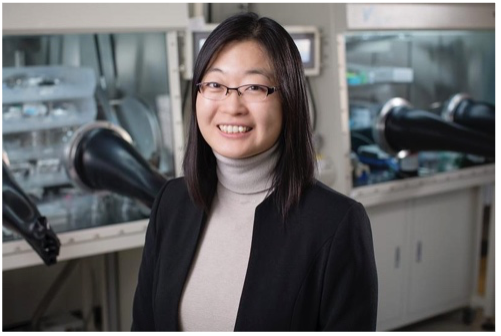Graduate Seminar Series
November 04, 2022
12:20 p.m. ET
Porter Hall - Room 100
November 04, 2022
12:20 p.m. ET
Porter Hall - Room 100
Printing technologies have the potential to revolutionize manufacturing of electronic and energy materials by drastically reducing the energy cost and environmental footprint while increasing throughput and agility. For instance, printing organic solar cells can potentially reduce energy payback time from 2-3 years to as short as 1 day! At the same time, additive manufacturing of such functional materials brings a new set of challenges demanding exquisite control over hierarchical structures down to the molecular-scale. We address this challenge by designing interfaces and fluid flow central to all printing processes. This approach is demonstrated through controlling chiral helical structures of semiconducting polymers. Our approach enables precisely controlled charge transport and power generation properties of printed semiconducting polymers to help advance their commercial viability in solar cell devices. The ability to control non-equilibrium assembly during printing sets the stage for dynamically modulating assembled structures on the fly. We demonstrate this concept by programming nanoscale morphology and structure color of bottlebrush block copolymers during 3D printing. This approach holds the potential to reduce the use of environmentally toxic pigments by printing structure color. Presently, we are working closely with the Molecular Maker Lab on machine-learning-guided autonomous synthesis and manufacturing of organic solar cells to address the stability bottleneck. Besides unlocking the potential of printing technologies in energy sustainability, we are developing printed electronics for remote monitoring of plant growth to support human space exploration.

Ying Diao is an Associate Professor, I. C. Gunsalus Scholar and Dow Chemical Company Faculty Scholar at University of Illinois at Urbana-Champaign. She received her Ph.D. degree in Chemical Engineering from MIT in 2012. Her doctoral thesis was on understanding heterogeneous nucleation of pharmaceuticals by designing polymeric substrates. In her subsequent postdoctoral training at Stanford University, she pursued research in the thriving field of printed electronics. Diao group, started in 2015 at Illinois, focuses on understanding assembly of organic functional materials and innovating printing approaches that enable structural control down to the molecular and nanoscale. Her work has been frequently featured in scientific journals and news media such as the Science Magazine and Nature Materials. She is named to the MIT Technology Review’s annual list of Innovators Under 35 as a pioneer in nanotechnology and materials. She is also a recipient of NSF CAREER Award, NASA Early Career Faculty Award, 3M Non-Tenured Faculty Award and was selected as a Sloan Research Fellow in Chemistry as one of the “very best scientific minds working today.”
December 5 2025
12:45 PM ET
Materials Science and Engineering
"Bridging AI and Quantum Materials: Opportunities and Challenges” presented by Mina Yoon, Oak Ridge National Laboratory
7500 Wean Hall
December 10 2025
8:30 AM - 5:00 PM ET
Materials Science and Engineering
Molecular Engineering of Soft Materials Symposium
The symposium will highlight cross-disciplinary research across CMU departments, with the goal of advancing soft materials research.
5201 Scott Hall
December 11 2025
4:00 PM ET
Materials Science and Engineering
M.S. Program Information Session
Join us online to learn more about becoming part of the graduate student community through our master's degree programs.
Virtual